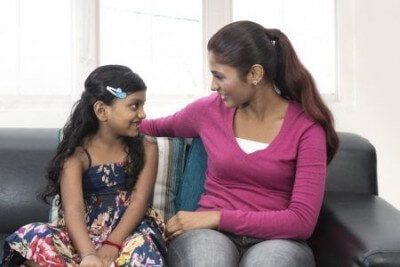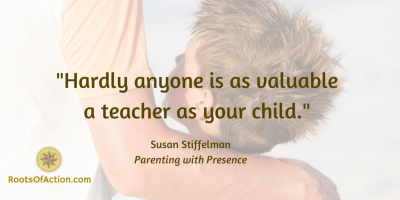
Listening to one another is one of the most important ways parents and children create close, loving relationships.
When kids feel seen, heard, and understood, they learn the meaning of empathy. They acquire the abilities to emotionally connect with others, make friends, and develop lifelong social skills. Yet listening is often one of the greatest challenges for families.
How can parents and children improve their listening skills and understand each other better?
In her new book, Parenting with Presence: Practices for Raising Conscious, Confident, Caring Kids, marriage and family therapist Susan Stiffelman offers proven, practical strategies that help parents grow more empathetic and connected children. What I love most about her approach is that she not only sees parenting as a process of raising children, but also an opportunity for personal growth.
“Parents are certainly teachers or guides for our children,” says Stiffelman, “but if you step back and see everything in your life—including child-rearing—as opportunities to learn more about yourself and grow as a person, then hardly anyone is as valuable a teacher as your child.”
Active listening is a practice that helps everyone grow in their understanding of others—parents and children alike. Especially for children, listening is the great equalizer—a set of behaviors that helps kids see themselves more “equal with” rather than “less than “others. When families practice good listening skills, they feel heard and understood—a win-win for families, even when no agreement is reached.
Listening for “Three Yeses”
One of Stiffelman’s listening exercises for families drew my interest because of its ease of use and potentially powerful results.
The next time you and your child have difficulty listening, try this simple exercise. Ask your child to talk about the topic in question for two to three minutes while you listen. The person doing the listening is not allowed to interrupt, disagree, roll eyes, or in any way belittle the person speaking.
When your child is finished, you ask questions or summarize what you heard until your child generates “three yeses.” And then, the process is reversed; the child practices listening.
Stiffelman provides a great example of this listening exercise in her book, excerpted with permission* as follows:
Thomas: “Mom, it makes me really mad when you are so cranky in the morning. I don’t like it when you come into my room all mad and yelling at me. You’re a lot nicer to Jen. It’s not fair. I’m tired in the morning and I wish you would let me sleep more. I don’t see why I have to get up at 6:45. We don’t even leave till 7:30, and I don’t need as much time to get ready as she does. I don’t even want to eat breakfast, but you make me and I’m not even hungry. I could just have a breakfast bar in the car. But you still make me get up and sit at the table, and I wish you’d let me stay in bed longer. I’m really tired. That’s all I wanna say.”
Mom: “Thanks, Thomas. So, one thing I heard you say is that you don’t see why you have to get up so early. It seems like you can get ready in less than forty-five minutes.”
Thomas: “Yes.” (Mom has gotten her first yes.)
Mom: “I also heard you say that you really don’t like it when I yell in the morning. That really doesn’t feel good.”
Thomas: “Yep. That’s right.” (Two yeses.)
Mom: “And I think I heard you say that you wish you could have your breakfast in the car.”
Thomas: “No, I just want to eat a bar in the car. Not a whole breakfast.”
Mom: “Okay. You wish you could have a breakfast bar in the car. So you could stay in bed longer.”
Thomas: “Yes!” (Three yeses.)
Mom: “Okay—got it. Thank you for sharing all that with me.”
Now it’s mom’s turn. She gets to respond—respectfully—to what Thomas has said, and it is now his turn to get three yeses so she also feels heard.
Mom: “I understand that you’re really tired in the morning, and it’s super hard to get out of bed. But it’s hard for me, too. Every morning when I head down the hall to your room, I get tense because I don’t feel up to facing another battle with you. I have to be at work by 8:30, and if I don’t drop you guys off at school right on time, I’ll be late, and then I’ll have to deal with my boss giving me dirty looks all day — maybe even thinking I don’t take my job seriously enough. I wish we could start our mornings off in a friendlier way because I love you and it hurts my heart to fight with you. It hurts both of us. I wish you would go to bed on time so you weren’t so tired, so we could start our day out in a loving way without my feeling so stressed from the very start.”
Thomas: “Okay. Um, one thing I guess you said was that if we’re late for school you get in trouble at work if you’re late.”
Mom: “Yes, that’s about right. I don’t get in trouble — like being sent to a principal’s office or anything — but my boss notices and doesn’t like it at all.” (Thomas has gotten his first yes.)
Thomas: “Okay. And then I heard you say that you get tensed up when you’re coming into my room because you don’t want to have another fight.”
Mom: “Yes.” (Two yeses.)
Thomas: “Hmm. . . I can’t remember what else.” Mom speaks for another minute or so to clarify.
Thomas: “Oh, yeah. You also said that you wish that we could start our day out happier. You said you love me and you don’t like it when we don’t have a good morning.”
Mom: “That is very true. Thank you for listening, Thomas. I really appreciate it.” (Three yeses.)
Three Skills Linked to Good Listening
The three skills most often associated with good listening are:
1) Respect the other person.
2) Listen more than you talk.
3) Always seek understanding.
The “Three Yeses” exercise is a great way to practice these three skills! At first, it may seem awkward. But with practice, it can become a tool for better listening between parents and children, or between siblings.
Listening helps parents and children get beyond surface conversations, and helps parents better understand the interior lives of their children. It challenges us to test and often let go of long-held assumptions about what we think and believe. When families practice active listening, their relationships thrive, they connect emotionally, and everyone grows.
What ways do you practice active listening with your children?
If you want more helpful advice about how to be fully present with your child—to help your family develop healthy, caring relationships—order Stiffelman’s excellent book, Parenting with Presence: Practices for Raising Conscious, Confident, Caring Kids,
___________________________________________________
*Excerpted from the book Parenting with Presence: Practices for Raising Conscious, Confident, Caring Kids ©2015 by Susan Stiffelman. Printed with permission of New World Library.
Image Credit: sjenner13/123RF
RELATED TOPICS:
Published: April 27, 2015
Tags: character strengths, empathy, happiness, learning, moral development, parenting, positive values, positive youth development, problem solving



